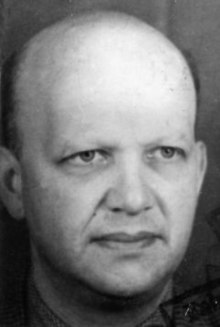Franz Altheim
This article includes a improve this article by introducing more precise citations. (September 2020) ) |
Franz Altheim | |
|---|---|
 | |
| Born | 6 October 1898 Frankfurt, German Empire |
| Died | 17 October 1976 (aged 78) Münster, West Germany |
| Nationality | German |
| Academic background | |
| Alma mater |
|
| Thesis | Die Komposition der Politik des Aristoteles (1921) |
| Doctoral advisor | |
| Other advisors | |
| Academic work | |
| Discipline |
|
| Sub-discipline |
|
| Institutions |
|
| Notable students | Ruth Altheim-Stiehl |
| Main interests | History of classical antiquity |
Franz Altheim (6 October 1898 – 17 October 1976) was a German
Early life and education
Franz Altheim was born in
Career
Altheim worked as a private lecturer at the University of Frankfurt from 1928 to 1935.
A member of the Sturmabteilung, Altheim conducted research projects with Ahnenerbe financing in the 1930s. With his partner Erika Trautmann, Altheim went on research expeditions to Italy, Sweden, Romania and the Middle East, during which he prepared reports for the Sicherheitsdienst. In 1943, Altheim was appointed Professor of Classical Philology at the University of Halle. His research centered on the history of classical antiquity, and many of his monographs on this subject were translated into other languages.
Altheim was dismissed from the University of Halle after World War II, but was soon reinstated. In 1948 he was appointed Professor of Ancient History at the University of Halle. In 1950, Altheim was appointed Chair of Ancient History at the newly created Free University of Berlin. After retiring in 1964, Altheim moved to Münster, where he died on 17 October 1976. He was survived by Ruth Altheim-Stiehl, his student and adoptive daughter.
Selected works
- Griechische Götter im alten Rom, 1930
- Terra Mater, 1931
- Römische Religionsgeschichte, 1931–1933
- Epochen der römischen Geschichte, 1934–1935
- Lex sacrata, 1939
- Die Soldatenkaiser, 1939
- (with Erika Trautmann): Vom Ursprung der Runen, 1939
- (with Erika Trautmann): Italien und die dorische Wanderung, 1940
- Italien und Rom, 1941
- Rom und der Hellenismus, 1942
- Helios und Heliodor von Emesa, 1942
- (with Erika Trautmann-Nehring): Kimbern und Runen. Untersuchungen zur Ursprungsfrage der Runen, 1942
- Die Krise der alten Welt im 3. Jahrhundert n. Zw. und ihre Ursachen, 1943
- Goten und Finnen im dritten und vierten Jahrhundert, 1944
- Weltgeschichte Asiens im griechischen Zeitalter, 1947–1948
- Römische Geschichte, 1948–1958
- Literatur und Gesellschaft im ausgehenden Altertum, 1948–1950
- Der Ursprung der Etrusker, 1950
- Roman und Dekadenz, 1951
- Geschichte der lateinischen Sprache, 1951
- Aus Spätantike und Christentum, 1951
- Attila und die Hunnen, 1951
- Niedergang der alten Welt, 1952
- (with Ruth Stiehl): Asien und Rom, 1952
- Alexander und Asien, 1953
- Gesicht vom Abend und Morgen, 1954
- (with Ruth Stiehl): Ein asiatischer Staat, 1954
- Reich gegen Mitternacht, 1955
- Der unbesiegte Gott, 1957
- Utopie und Wirtschaft, 1957
- (with Ruth Stiehl): Finanzgeschichte der Spätantike, 1957
- (with Ruth Stiehl): Philologia sacra, 1958
- (with Ruth Stiehl): Die aramäische Sprache unter den Achaimeniden, 1959–1963
- Geschichte der Hunnen, 1959–1962
- Zarathustra und Alexander, 1960
- Entwicklungshilfe im Altertum, 1962
- Die Araber in der alten Welt, 1964–1969
- (with Ruth Stiehl): Geschichte Mittelasiens im Altertum, 1970
- (with Ruth Stiehl): Christentum am Roten Meer, 1971–1973
See also
References
- ISBN 1401383866.
- ^ a b c d e f g h Pringle 2006, p. 125.
- ^ a b c d Pringle 2006, p. 126.
Sources
- ISBN 978-3-476-02033-8, Sp. 24 f.
- "Franz Altheim". Martin Luther University of Halle-Wittenberg(in German). Retrieved September 3, 2020.
